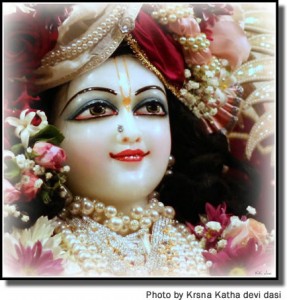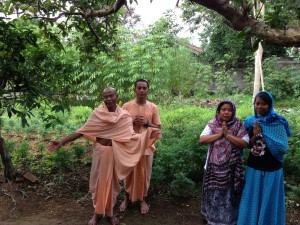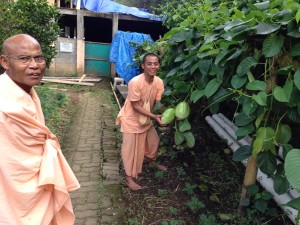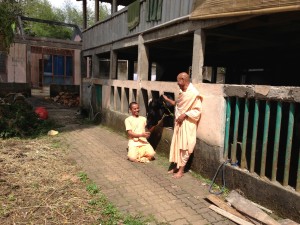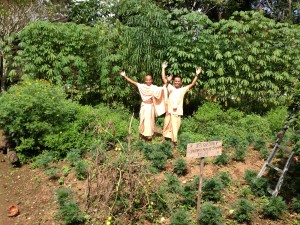2013-07-21 Festival Drama – How Sri Sri Radha Gopinath Appeared by their Own Sweet Will
2013-07-21 Festival Drama – How Sri Sri Radha Gopinath Appeared by their Own Sweet Will
332. Service
→ 9 Days, 8 Nights
Sitting by the potted plant up at Srila Prabhupad’s room, I observed how a plant gives away vital oxygen for all life to sustain and also shows off its beauty to the world in just a single colour. Huge contributions and yet they remain at a spot undistracted, in a humble state and silently. What good qualities to serve someone. Encouraged, I drew a quick sketch of the plant I started at.
What is the conscious mind and the unconscious mind?
→ The Spiritual Scientist
From: Keshav
What is difference between unconscious mind and conscious mind ?
Where are they located ?
Which mind is responsible for reality and which for imagination ?
Is it correct that they exist simultaneously ,
if they exist , then how can i make difference between real and imaginary.
Are the Vedic scriptures faith-based theology or logic-based philosophy?
→ The Spiritual Scientist
From: Keshav
What is difference between Theology and Philosphy ?
In which category do our scriptures fall ?
I have heard Theology starts with belief and only faith , but philosphy starts with a doubt , logic and solution .
How can we deal with doubts rising on seeing that many leading Prabhupada disciples are no longer practicing KC?
→ The Spiritual Scientist
Most of the ISKCON leaders described in the Lilamrita are not in ISKCON now. Why is that?
Why do many Vedic sages engage in behavior that is lower than the moral standards of modern Vedic practitioners and even many modern atheists?
→ The Spiritual Scientist
Vedic sages like Brihaspati cohabit with other's wives, whereas today's devotees follow the regulative principles. Many atheists also follow moral principles.
How can we absorb ourselves in devotional service?
→ The Spiritual Scientist
From Manoj
When all did Krishna reveal the universe in his mouth to Mother Yashoda?
→ The Spiritual Scientist
From: Nityānanda Chandra Dās
Are there 3 separate pastimes of Krishna revealing the universe within his mouth?
1. "Mata, Krishna ate dirt lila" - Śrīmad Bhāgavatam 10.8.32-42
2. Mother Yaśodā nursing baby Krishna lila - Śrīmad Bhāgavatam 10.7.34-37
And finally
3. Damodara Lila per - Śrīmad Bhāgavatam 2.7.30 verse and purport http://vedabase.com/SB/2/7/30
09.12 – Seeing the infinite through finite filters makes finite illusions infinite
→ The Spiritual Scientist
Skeptics deride Krishna’s pastimes like lifting Govardhan hill: “How could anyone have lifted such a huge object? How could he have found its center of gravity?”
Krishna doesn’t have to find the center of gravity because he is the source of gravity. Material nature with all its laws such as gravity work under his supervision, as the Bhagavad-gita (09.10) indicates. So he can, at his will, suspend the laws of nature, just as the head of state can suspend the laws of traffic.
The laws of nature, as we know them, are our logical inferences derived from our finite capacities and our finite experiences. Though they may help in our study of the finite, but they can harm when extrapolated and imposed on the infinite. They act as a distorting filter that erroneously reduces the infinite to the finite.
By expecting Krishna who is infinite to conform to the limits of the finite, we deprive ourselves of authentic understanding of the infinite. The Bhagavad-gita (09.11) indicates that those who equate Krishna with finite mortals get it all wrong (avajananti mam mudha), for they overlook his supreme position (param bhavam ajananto).
The next verse (09.12) asserts that all their efforts end in futility (mogha), and they fall deeper into illusion (prakritim mohinim shritah). Indeed, their illusion continues for as long as they keep seeing the infinite through finite filters. Thus, they make their finite illusions infinite. That is, their narrow filters cause the illusion to persist infinitely, for as long as they hold on to those filters.
When Krishna suspends the laws of nature, those demonstrations of his supremacy invite us to transcend the limits of the finite. By accepting his invitation we open our heart to receive and relish his infinite love.
***
09.12 - Those who are thus bewildered are attracted by demonic and atheistic views. In that deluded condition, their hopes for liberation, their fruitive activities, and their culture of knowledge are all defeated.
The way to forming an ideal society
→ The Spiritual Scientist
The wealth of the world should be used for the welfare of all living entities, for that is the plan of Mother Nature. Everyone has the right to live by utilizing the wealth of the Lord. When people learn the art of scientifically utilizing the Lord's property, they will no longer encroach upon one another's rights. Then an ideal society can be formed.
Totally relaxed
→ KKS Blog
(Kadamba Kanana Swami, 4 May 2013, Radhadesh, Belgium, Free Lecture)
 When we see everything in relation to Krsna, then we can be very relaxed.
When we see everything in relation to Krsna, then we can be very relaxed.
“Okay, it’s Krsna’s external energy. I prefer Krsna’s internal energy, but this is also related to Krsna and can be used for Krsna.”
Like you see in Prabhupada. He’s very relaxed. Prabhupada is not uptight, as if he’s in a fight with maya – he’s totally relaxed.
Thursday, August 1st, 2013
→ The Walking Monk
North York, Ontario
Connie and Pauline are both sisters of mine in their fifties, while Jordon, Connie's son, is a young university-aged guy. They and I teamed up for a walk along the Don West River where water was gushing forth from the previous night's stretched-out rainfall. It became a familial walk as much as it was naturally and aesthetically pleasing.
We got caught up in things; new with anything to do with the views of Ralph Nader to recounting walking monk encounters with people and to the notation of vegetation all around us to the Pope's recent remarks about gay people. The hearing and chatter of subject matters held a full range that took us all over the world. Our minds were immersed in past and current affairs. We actually left the Don River several times mentally before it was time to terminate the walking for snacks at Pauline's - cucumber chunks to dip into a batch of her homemade hummus.
It's occasions like this that gives me a chance to insert a little something about spirituality. My kith and kin always show some interest. There's never been hostility or major resistance when the subjects have surfaced. I've resigned to the fact that I won't convert but to play the role of brother and uncle. I can't resist, in their company, to poke at their regular carnivorous eating habits. It's their customary choice and there's not much I can do.
Anyways, this is more or less an annual kind of coming together and with the very little baby steps taken to evolve, I believe we all are moving forward in some way.
7 KM
SB 8.3.19 Speak the Lord’s glories not to remind him but to remind ourselves of them and to express our faith to him
→ The Spiritual Scientist
Even The Shadow Of The Name
→ Japa Group

Even the shadow of the name brings liberation, just as the first rays of the dawn chase away the ghosts and thieves of the night. “Yet still I live in the shadow of the name,” he thinks. “Should I even aspire to rise? Let me try first to stay awake, free of illicit desire, properly pronouncing Hare Krsna, Hare Krsna, Krsna Krsna, Hare Hare/Hare Rama, Hare Rama, Rama Rama, Hare Hare. Even I can be transformed.
Inequality is a natural product of material society
→ Servant of the Servant
In the past 200 years, say...since the beginning of industrialization, powerful leaders took upon themselves to lead the society and their respective countries to promising futures sustainable not only for them but for generations to come. Consumer capitalism (economy driven by market forces) was seen as an ideal strategy by leaders as it reinforced the idea of democracy, freedom and expression of individual creativity. In other words, every one begins with a level playing field to compete in this grand modern day race of "rising to the top" (economically, politically, and socially). America as a country captured the spirit of this ideology and led the world as the "Land of Opportunities".
Meanwhile, on my conversation about God, according to the Bhagavad Gita, a society without God in the center will disintegrate in time. The Gita states that any work done purely to satisfy one's self without Krishna or God is a cause of bondage and misery. The reasoning behind this is that God is the Master and we (living beings) are supposed to "cooperate" with one another to honor the Master. In this spirit of cooperation and honor, God nourishes our body, mind and soul.
Now, back to consumer capitalism, it is an economic model where the modus operandi is to "compete" and "not cooperate" to survive. Such competition can give rise to greed leading to suppression of the weak. As a result, today, more than ever, 4 out of 5 Americans are in poverty and top 1% of the population holds more money than all people put together. No more is it a level playing field where equal opportunities are promoted. The wealthy and powerful have a pole position. As a result the rest are left behind - the very backbone of democracy and freedom is put into question as a result of such lopsidedness.
Therefore we have to bring God back into society as the creator, maintainer and provider. By cooperating with one another in a mood of service and by putting God in the center we can practically realize a spiritual society free from inequalities.
Hare Krishna
ISCOWP July 2013 update
→ The Yoga of Ecology
A Day In The Life of the Green Wheeling Initiative
→ The Yoga of Ecology

In my previous "Yoga of Ecology" post, I shared the truly brilliant and compassionate work of the Green Wheeling Initiative (GWI), a grassroots ground-up local food movement in Wheeling, W. Va. The GWI is helping the diverse peoples of Wheeling to reclaim their backyards and the bounties in their backyards through community gardens, cultural workshops, grant programs, and campus ecology events, amongst much else.
Terry Sheldon, one of the co-founders of the GWI, explains in an article on the GWI in the local Wheeling Intelligencer that "in a very positive way, we are trying to provide an alternative food system that creates a healthy environment for Wheeling. We're convinced through local partnership that we can create a local food economy around the issue of food that are grown by and consumed by people in the Wheeling area."
It is a project at the forefront of the just sustainability movement, which bridges the gaps between the environmental justice and the sustainability movements. In my eco-theology studies at Union Theological Seminary in New York, I was introduced to the conflict between the environmental justice (EJ) movement and the sustainability movement. Critics of the EJ movement may say that the work of EJ groups are too human-centric in their focus. They may argue that by being overtly focused on insuring justice for people in largely impoverished and marginalized communities, on insuring freedom from pollution and toxicity being dumped in their backyards, the EJ movement fails to fully acknowledge broader ecological issues involving non-human life/ life systems. Critics of the sustainability movement argue that by focusing overtly on these broader ecological issues, the gritty issues of incinerators and toxic waste being dumped in impoverished communities, and all the resultant health problems that come along with, are not given specific and proper attention, care, and concern.
The just sustainability movement can create an synthesis of concern and action that works to honor, correct, and improve the needs and lives of those who have been ecologically prejudiced against and marginalized, whether they are human or not. Julian Agyeman, EJ advocate and chair of the Department of Urban + Environmental Policy + Planning (UEP) at Tufts University, in his book Sustainable Communities and the Challenge of EJ, writes:
"Just sustainability highlights the pivotal role that justice and equity could and should play within sustainability discourses. In so doing, it fundamentally challenges the current, dominant, stewardship-focused orientation of sustainability, which has as its main concern the conservation of the natural environment, namely environmental sustainability...Transformative or just sustainability implies a paradigm shift that requires sustainability to take on a redistributive function. To do this, justice and equity must move center stage in sustainability discourses, if we are to have any chance of a more sustainable future."In spending time with Terry as an apprentice at his Small Farm Training Center in nearby Moundsville, W. Va., I've had the chance to see and experience the Green Wheeling Initiative first-hand and in action. Terry has introduced me to the very people who give life to the local food movement in Wheeling, who understand, despite being in the "belly of the beast" in West Virginia, where the poverty and obesity epidemics reign supreme, that they can reclaim the health and wealth in their own backyards.
Here is a photo essay of a day in the life of the Green Wheeling Initiative, and we hope you are inspired to share what is going on here and that it inspires you in your own just sustainability efforts.
A DAY IN THE LIFE OF THE GREEN WHEELING INITIATIVE
Every Tuesday Terry brings in at least eight boxes of swiss chard, or "West Virginia spinach" as the locals like to call it, to various soup kitchens in the Wheeling area, such as Catholic Charities Neighborhood Center and the Soup Kitchen of Greater Wheeling. Terry hopes that his contributions can be an encouragement towards integrating organic and local food, as an alternative to processed foods, into the serve-outs, food-boxes, and meals on wheels that make up the local charity networks.
Our journey on this Tuesday begins somewhat ominously, as Terry takes a shortcut on a dirt road through one of the local coal mines. He tells me that the coal residue on the road is highly toxic yet there is no regulation for its safe disposal, if such a thing exists. He tells me that the air in this part of the country is dirtier, because of the coal residue, than it is in my home locale of Manhattan.
One of the first aspects of the GWI that Terry showed me was the community gardens in some of the local schools in the Wheeling area. The challenge is to scale up, to find a way to integrate a garden into student bodies with hundreds of students, giving them each some little plot of investment. But the raised bed gardens at these schools are a good head start, creating a momentum and flow that could grow into something quite nourishing. The GWI has community gardens in four elementary schools, one preschool, and two universities in the Wheeling area.

The community garden at Woodsdale Elementary in Wheeling.


The community garden at Wheeling Jesuit University

Corn as high as an elephant's eye at Wheeling Jesuit

Raised bed community garden at McNinch Primary in Moundsville, WV
We next moved on to the 18th Street Overpass Garden, which we mentioned in our previous piece as being the epitome of the potential for urban agriculture.
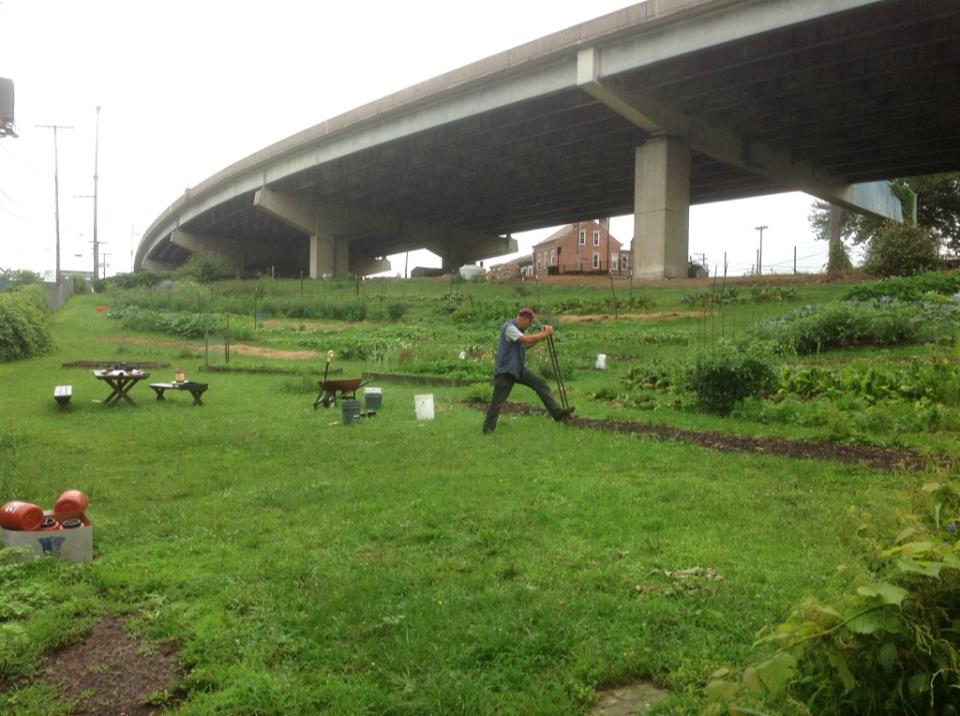
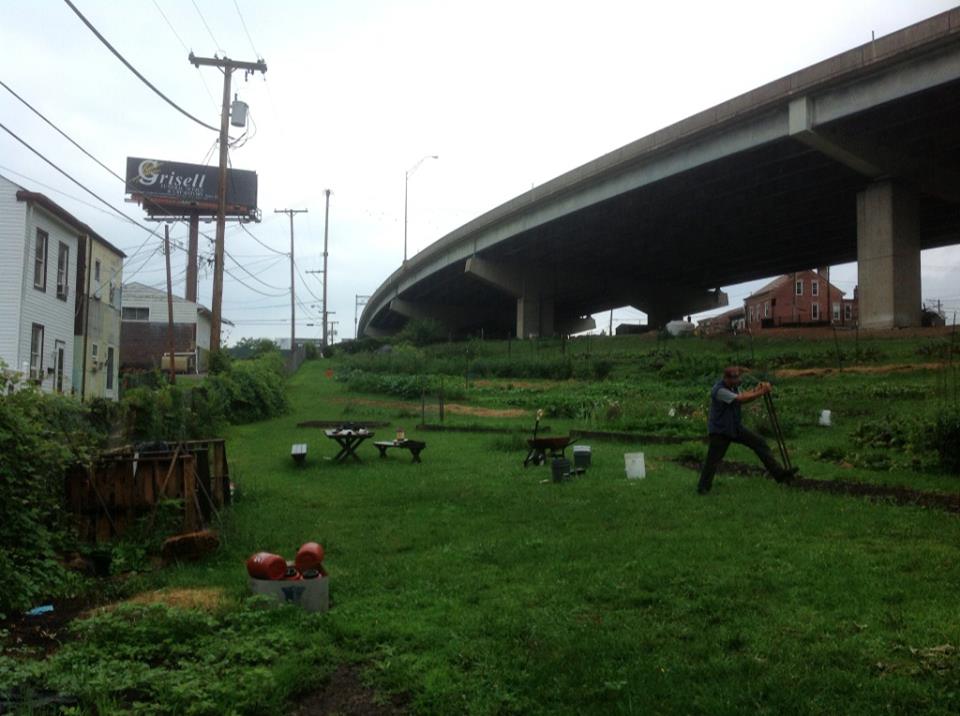
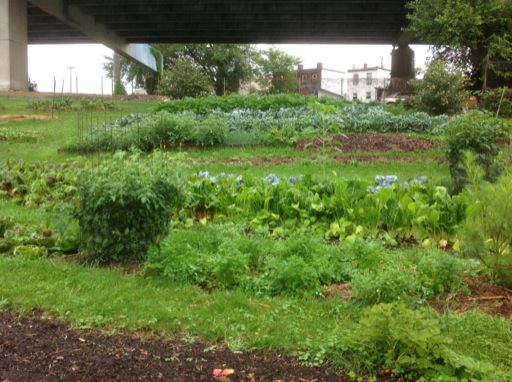
The GWI holds workshops for the local community and envisions a culture around the Overpass Garden which would include regular block parties and vegetable carts that could travel into the surrounding blocks and sell vegetables from the garden to the local residents, which would keep money in the community.
The Overpass Garden is a fore-runner of the green-collar economy, of retrofitting urban environments for urban gardening and farming. Like similar projects in other blighted locations such as inner-city Detroit, the Overpass Garden shows how community and ecology can be re-born in the ashes of the "American Dream."
The next place we came too was where the Green Wheeling Initiative originally came into being: West Virginia Northern Community College (WVNCC), in downtown Wheeling. One of the founders of the GWI, Gene Evans, was a professor in the Culinary Arts program at WVNCC and helped inspire the founding of the Culinary Arts Garden on the campus.


Terry tells a wonderful story of his own initial connection with WVNCC. Participating in the annual Harvest Fest which takes place on the campus, he met a member of the community who was very piqued by his presentations on local ecologically and economically sound food culture. When Terry told her his vision of making organic food fully affordable to the people of Wheeling, she was moved to tears. It so happens that this woman is the wife of Martin J. Olshinsky, the president of WVNCC. Soon after, over fifty culinary arts students from WVNCC toured Terry's Small Farm Training Center project.

The GWI hopes to inspire, via the Culinary Arts Garden, a new curriculum within the Culinary Arts program at WVNCC which would focus on helping students become advocates and activists for the local food culture in Wheeling. The idea is that this program would empower the students with knowledge of how to grow, cook, find, and share local foods in the Wheeling area.

We next visited the raised bed gardens of King's Daughters Child Care. The garden is full of peppers, zucchini, potatoes, sunflowers, and much more. Over the past three months Terry has held 13 mini-workshops for the preschoolers who attend the child care program. Besides the tremendous amount of loving hilarity that comes along with interacting with these precocious personalities, Terry hopes to provide an example of how gardening can be integrated into the lives of all people in Wheeling, from preschoolers to wise old sages.

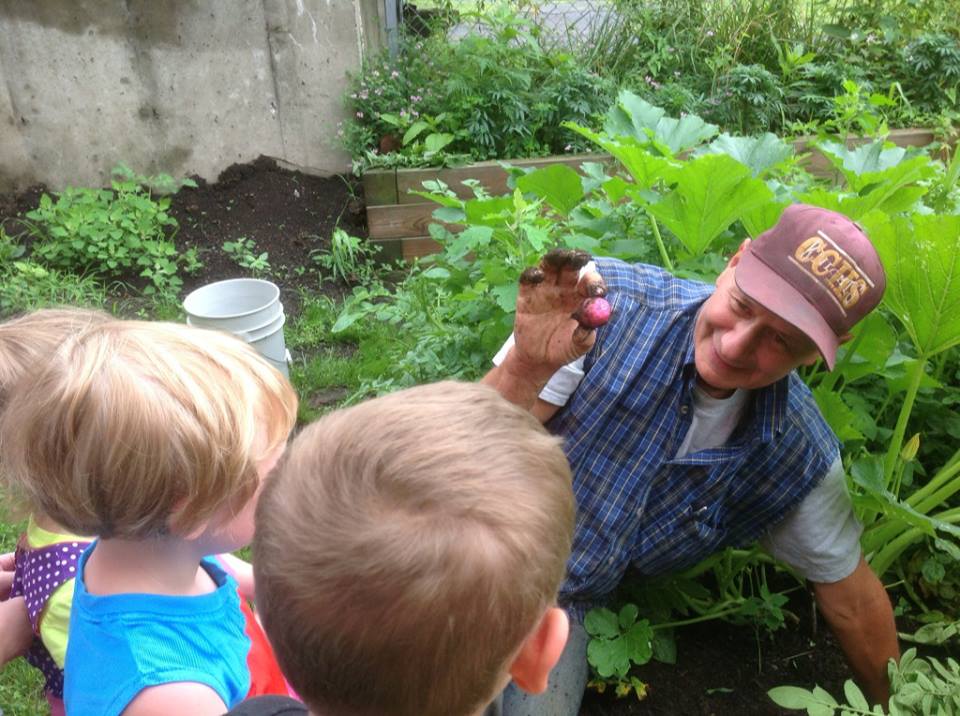

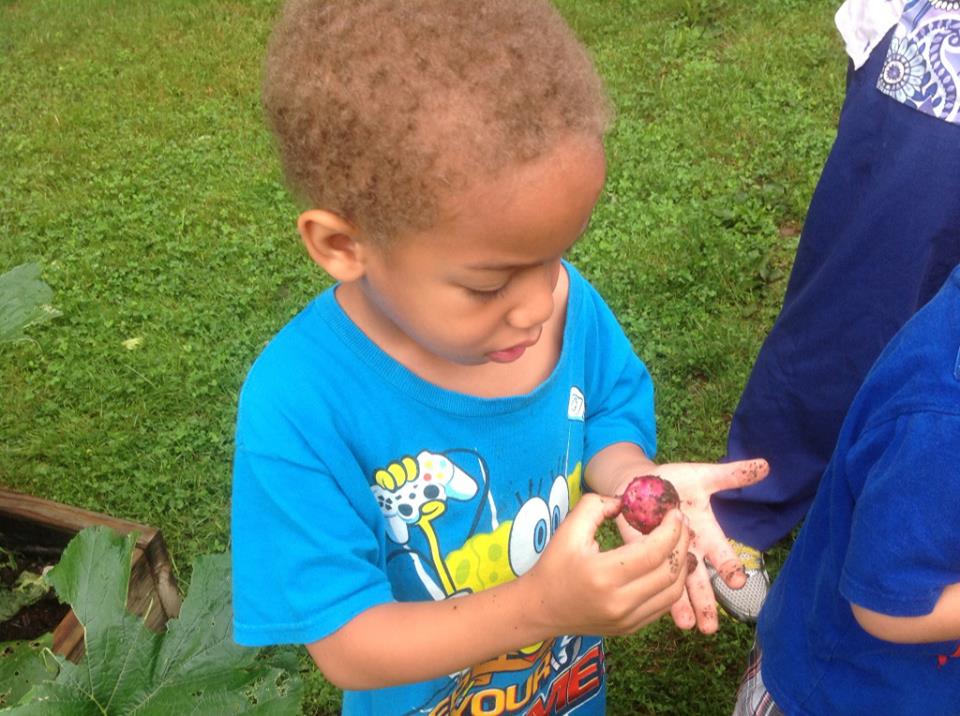
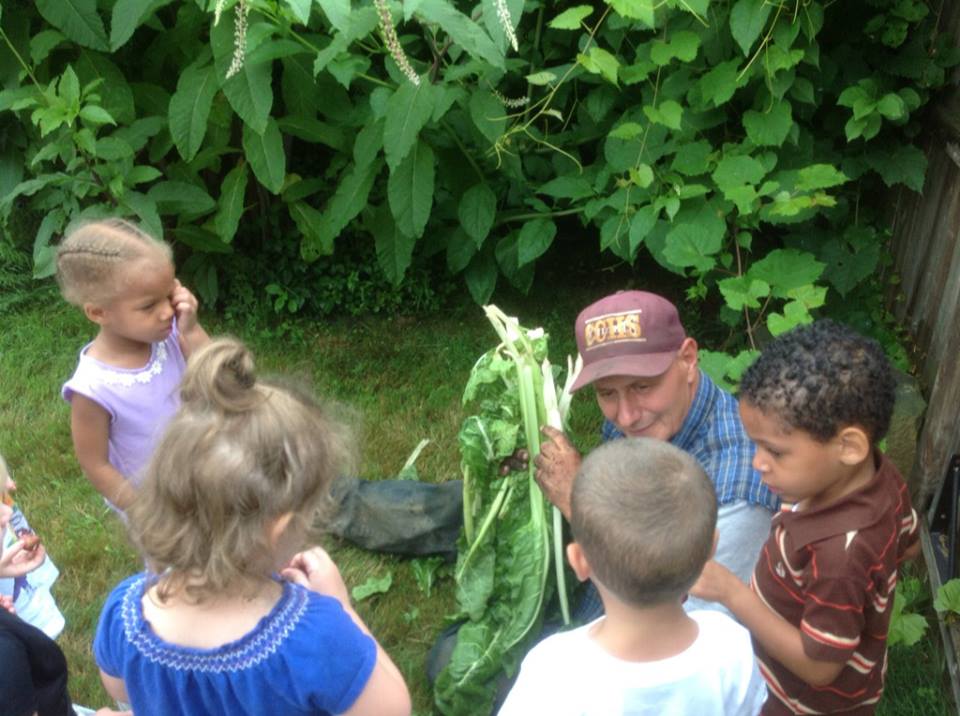
A hands-on experience for the kids in picking swiss chard (or "West Virginia spinach") leaves off their stalks
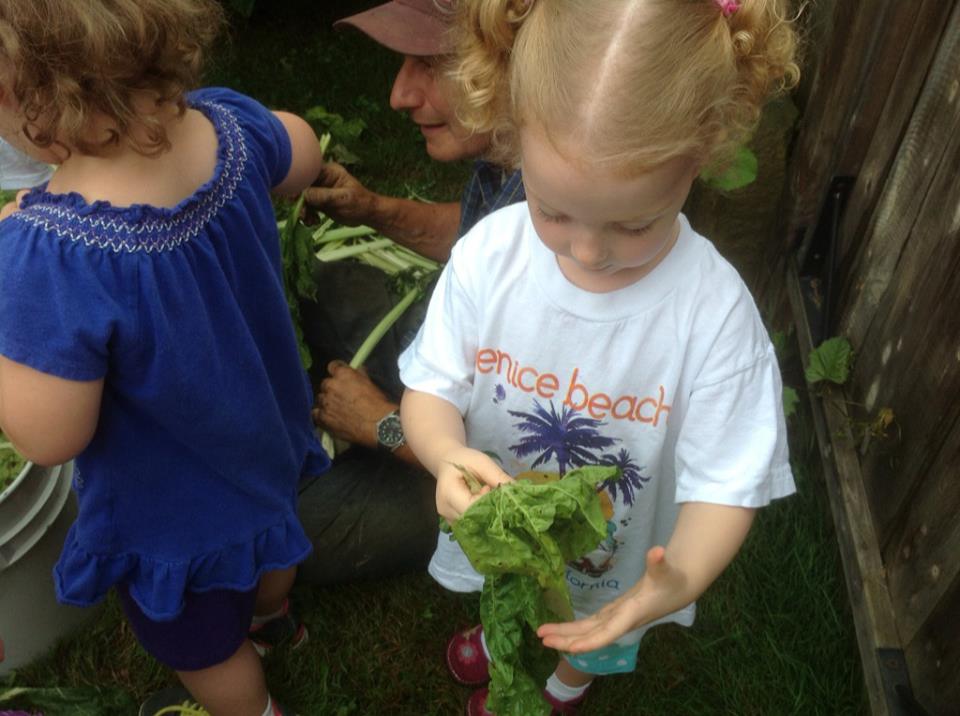


The kids favorite part of the mini-workshop: getting to water the garden...

...and they have some pretty unorthodox watering techniques


On Wheeling Island is the Island Rats Community Garden, with 25 raised beds and active patronage from members of Wheeling television and media.
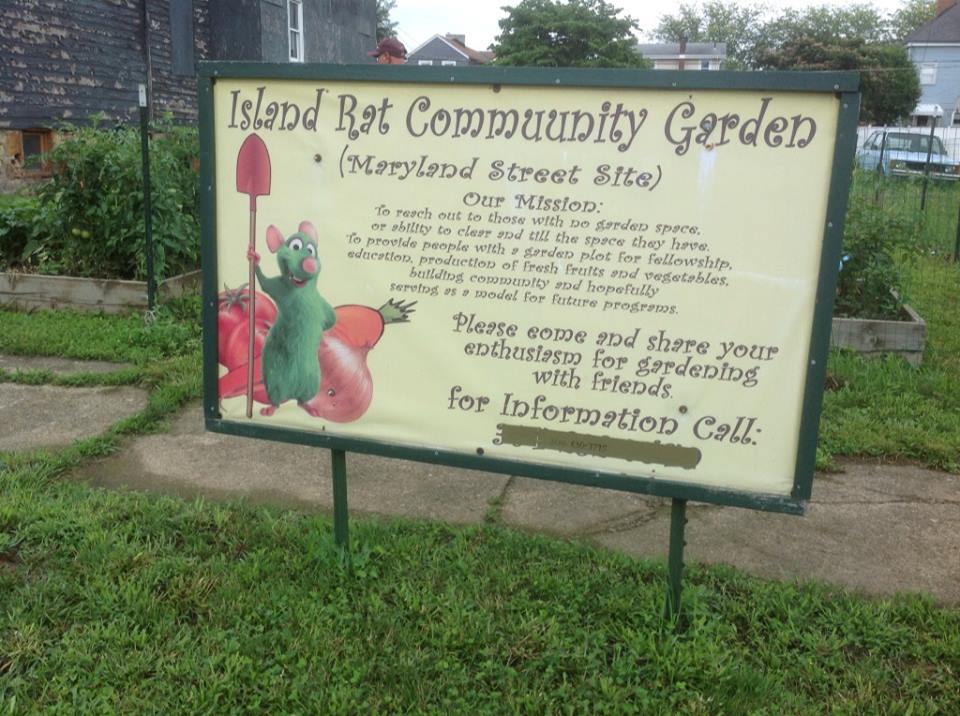



Last and certainly not least, we visited the home of Shannon, a house-mom with five kids and a husband who is an over-qualified coal miner with bigger dreams. Shannon has offered to become one of the main caretakers of the community garden at McNinch Primary. Terry and I were very impressed with her commitment to making sure her kids were given as much fresh and healthy food as she could possibly cook. It is moms like Shannon who in many ways are the real cutting-edge of the local food movement not only in Wheeling, but around the globe.
Quoted once again in the Wheeling Intelligencer, Terry speaks about Wheeling living up to its real potential. "It makes the tagline of 'The Friendly City' very real. Farming is not solemn work that you do all by yourself just to feed your family. The joy of farming, the joy of gardening is when it's done as a cooperative effort. We're trying to create a culture in which people want to work together."
Click here to listen to Terry's interviews on the Green Wheeling Initiative and the Small Farm Training Center with West Virginia Public Broadcasting.
The Green Wheeling Initiative on Facebook
Diving In
→ travelingmonk.com
Harinama with Jayadvaita Swami, July 31 2013, Union Square, NY
→ Dandavats.com
Huge gathering of vaishnavas in Saratov, Russia, 30 July, 2013
→ Dandavats.com
Sri Dwarka Dhama
→ Dandavats.com
Children’s festival of Chariots @ Gage Park – August 10th @ 10:00am
→ ISKCON BRAMPTON'S BLOG
ISKCON Brampton is pleased to invite His Grace Visvakarma Prabhu this Sunday. His Grace Visvakarma Prabhu this Sunday joined the movement in Jan. 1971 in Hamilton. He was personally initiated in Detroit in July by Srila Prabhupada in Detroit and was given second initiation in New York by Srila Prabhupada in 1972. 1971 – 1985 he served as President of ISKCON Toronto, Regional Secretary Canada, Chairman Temple Presidents World Wide and Chairman Temple Presidents North America. He organized the purchase of the Temple at Avenue and Roxborough Streets in Toronto which is currently worth 15 million dollars and grew membership from 200 to 2000. He also opened and managed the Govinda’s Restaurant in the Yorkville district in Toronto. He also helped organize traveling Rathayatra Festivals across North America, which have been attended, by millions of people over the last 30 years.
The program consists of arati, kirtan (devotional chanting), philosophical discussion and prasadam. Please come, get inspired and inspire others through your desire to share Krsna Consciousness!
Program Schedule:
11.00 – 11.15 Tulsi Puja
11.15 - 11.30 Guru Puja
11:30 – 11:55 Aarti & Kirtan
11.55 - 12.00 Sri Nrsingadev Prayers
12.00 – 1:00 Vedic Discourse by His Grace Visvakarma Prabhu
1:00 – 1:20 Abhishekam of Lord Jagannath & Closing Kirtan
Upcoming event:
Children's festival of Chariots @ Gage Park - August 10th @ 10:00am
We are pleased to announce that ISKCON Brampton will be having the first children's festival of chariots (Ratha Yatra) in August 2013. Join us along with your family and friends for this special occasion. Gage Park is located at the intersection of Main St. S. and Wellington St. West in the historic downtown of Brampton. Free underground parking is available beneath City Hall.

10:00 am Opening Kirtan by the Hladini Group
10:45 am Opening Aarti
11:00 am Parade – Pulling of the Chariot in the Park
12:00 pm Final Aarti
12:30 pm Performance by the ISKCON Brampton Sunday School Kids
12:30 pm Yoga Meltdown (bring your own yoga mat)
1:00 pm Closing Kirtan by Gaura Shakti Group
2:00 pm Program Ends
There would be lots of fun activities for everyone: gopi dots - traditional face painting, crafts, yoga meltdown, Q & A, kirtan, dance…… and much more.
You are invited to bring 'bhoga' - vegetarian food offerings (no onion, garlic, eggs, vinegar) for Lord Krishna. We request that you bring offerings in new 1-2 serving sized aluminum foil containers. Offerings should be fresh and homemade (Nothing bought from store please). Lord Jagannath must be the first to taste your offering, therefore, no tasting or sampling. For more information regarding bhoga preparations, please contact Vidyanidhi Prabhu.
There is always opportunity to serve. Volunteers are needed for set-up, directing Ratha, prasadam distribution, clean-up. For more information on how you can serve, please contact Aindra Dasa by email vdussoye@gmail.com or call 905-636-9466. For sponsorships, please contact Mother Krsna Smaran (kavitabalram@yahoo.com).
Yoga means to link with God in loving exchange. Lord Krishna teaches in Bhagavad-gita (6.47) that the highest yogi is “he who always abides in Me with great faith, worshiping Me in transcendental loving service.” The Rathayatra Festival is a potent transcendental stimulus for developing love of Godhead. The Rathayäträ procession - The children’s festival of chariots is a spectacular parade of the hand–pulled chariot carrying Lord Jagannath, Baladev and Subadra amidst energetic singing, drumming and dancing - can attract even the materialistic person. By becoming attracted to the Supreme Lord in His form as Jagannatha one loses his attachment to the illusory happiness of the mundane world. Thus simply by seeing the Deities, simply by hearing the transcendental sound vibration of Hare Krishna, Hare Krishna, Krishna Krishna, Hare Hare/Hare Rama, Hare Rama, Rama Rama, Hare Hare, or simply by tasting foodstuffs offered to Krishna, anyone can begin his progress back to Godhead without difficulty. And by applying his energy in understanding the Krishna consciousness movement and participating in glorifying the all-blissful Lord of the universe, one can revive one’s eternal loving relationship with the Supreme Personality of Godhead.
Lord Balarama Appearance Day - Tuesday August 20th @ 7:00pm
Please mark your calendar for this special event. August 20th @ 7:00pm celebrations of Lord Balarama Appearance day at ISKCON Brampton.

He assumes five other forms to serve Lord Krishna. He Himself helps in the pastimes of Lord Krishna, and He does the work of creation in four other forms called the catur-vyuha (four armed) forms known as Vasudeva, Sankarshana, Pradyumna and Anirudha. He executes the orders of Lord Krishna in the work of creation, and in the form of Lord Sesa He serves Sri Krishna in various ways. In all the forms He tastes the transcendental bliss of serving Krishna. No one can approach Krishna without first getting the mercy of Baladeva.
Details about the program will be announced soon.
New Govardan Family Picnic
→ Dandavats.com
Here it is, Govinda’s – Debrecen
→ SivaramaSwami.com
Don’t let the unfinished exterior put you off. http://flic.kr/s/aHsjHf6ETw
Kirtana at Govinda’s Debrecen, August 1st
→ SivaramaSwami.com
Govinda’s Debrecen, the nicest Govinda’s in Hungary
→ SivaramaSwami.com
Lessons from the Teachings of Lord Caitanya 3
→ HH Bhakti Caitanya Swami
Meetings, Murtis and More
- TOVP.org
This past month has been eventful at the TOVP. There have been meetings with managers, architects, engineers, pujaris and artists, all coming together to make critical decisions about designs and construction.
Each department brought their own unique perspective. One of the most discussed topics were the altars. Placement of the deities and murtis were visualized with the help of prototypes and scaled models. Considerations included room for pujaris to manoeuvre, location of altars within allotted space and visibility of deities for pilgrims. The meetings continued and the team of professionals made decisions ranging from the structural integrity of the temple to the future of several architectural components of the building.
Since the experts and consultants working at the TOVP are spread across India, it can be difficult for everyone to gather together. However, when they do have the opportunity to convene in Mayapur, their combined talent and enthusiasm erupt into a passion to build an unparallelled temple.
August 2nd, 2013 – Darshan
→ Mayapur.com
The post August 2nd, 2013 – Darshan appeared first on Mayapur.com.
A GIFT
→ Gita Coaching
bhunjana evatma-krtam vipakam
SB 7.9.31 Purport
New Raman Reti Newsletter – July 2013
→ New Vrindaban Brijabasi Spirit
Click here to read the July 2013 newsletter from our sister community, New Raman Reti, in Alachua, FL.
Please visit and “like” the ISKCON Alachua Facebook Page!
2013-07-21 Festival – Abhisekh Of Sri Sri Radha Gopinath – ISKCON Chowpatty
→ Gouranga TV - The Hare Krishna video collection
2013-07-21 Festival – Abhisekh Of Sri Sri Radha Gopinath – ISKCON Chowpatty
06.45 – Bhakti is not a part of life; life is a part of bhakti
→ The Spiritual Scientist
Many people treat bhakti as an optional part of life: “You like bhakti, you practice it. I don’t like it, so I won’t practice it.”
At a functional level, this understanding of bhakti seems correct. After all, people are free to choose whether to practice bhakti or not.
At a factual level, however, perceiving bhakti thus as a voluntary cultural hobby misses its universal essence: the longing of the heart for undying love. We all long to love and be loved.
Gita wisdom explains that this longing can be perfectly and perennially fulfilled if we direct it towards the all-attractive Supreme Person, Krishna. And bhakti-yoga is the process of spiritual discipline by which we can redirect the heart’s bhakti instinct, its longing for love, towards Krishna. Over many lifetimes, we have been searching for love, a search that was essentially our bhakti instinct gone astray due to ignorance or intemperance.
Ignorance misdirects our love towards temporary objects instead of Krishna. But because all such things are temporary, whereas we souls are eternal, our longing stays perpetually unfulfilled.
Intemperance lets our love gets dragged towards worldly objects even after we come to know that Krishna is the best object for our love. Pertinently, the Bhagavad-gita (06.45) indicates that the attainment of spiritual perfection often takes many lifetimes.
By thus understanding our existence as a multi-life search for love, we see life, that is, our present lifetime, as a part of bhakti. And we see the relegation of a bhakti to an optional part of life as a correct-seeming ignorance that sabotages our willpower to focus our love on Krishna.
When we reject this ignorance and bring bhakti to the center-stage of our worldview, then bhakti swiftly grants our heart everlasting fulfillment.
***
And when the yogi engages himself with sincere endeavor in making further progress, being washed of all contaminations, then ultimately, achieving perfection after many, many births of practice, he attains the supreme goal.
Wednesday, July 31st, 2013
→ The Walking Monk
Toronto, Ontario
Insomnia hit hard once again. In addressing it I decided to put on my sneakers for walking. Before that, I donned rather large swimming trunks. Why? Well, it was raining out. Dhotis don't always score well in the wetness. Over the torso was a new gift, a dark blue XL T-shirt which reads, 'Volunteer for Festival of India.'
It was night time. Being summer the rain was warm, so little impediment is what I felt. My monk-in-cognito attire had purely to do with practicality; something I've learned from being a student of Srila Prabhupada.
Rain persisted. The walking persisted. The soft chanting persisted. It was a pleasant and liquid walk. I ended the walk just before midnight hoping to be fatigued enough. It just didn't come - the "feel" to sleep. The will was there.
I kept walking, but inside, now, in a dry setting, pacing back and forth. For a moment I dwelt on the curse that haunts me and then resigned to the fact that I'm giving more time to the mantra.
I ask for no pity. Everyone in this world has some deficiency, a personal issue, which might even cause one to reach for a tissue, a reaction.
We are reminded that along with this body, there's always some discomfort. That's clearly a message from the Gita - dukhalayam asasvatam.
Personally I wish that I didn't have to sleep. Think of the hours we could save and the service that could be rendered in that time! Introspectively I perceive those moments of wakefulness as precious because while the whole world is asleep, it appears only you and God are not.
10 KM
Radha Govinda Mandir
→ Ramai Swami
Devotees at our temple in Puncak, near Jakarta, Indonesia, are very keen on not only worshiping the deities but also looking after the cows and growing vegetables, fruits and flowers.
protection
→ everyday gita
Krsna is saying here, that He comes to deliver the pious and annihilate the miscreants. Those are some strong words and their meaning could very easily be misinterpreted to mean that the Divine which the bhakti texts speak of is not very compassionate. Nothing could actually be further from the truth.
This verse demonstrates exactly how loving and protective the Divine actually is.
To really understand what this verse means, it's important to understand what the words "pious" and "miscreants" mean as per the Gita. The pious, are those that are trying to live by the principles of humility, compassion, cleanliness, and truthfulness. They see everyone as spiritual sparks, worthy of their respect and try to live their lives as spiritual warriors who are empowered by grace. The miscreants, simply put, are those who try to destroy and hurt those who are trying to be pious.
I'd like to share a beautiful story that illustrates this point. In the great bhakti text known as the Srimad Bhagavatam, the life of a young bhakti yogi is described. At the tender age of five, a prince known as Prahalad became a great lover of the Divine. Despite his young age, he was greatly learned and shared his knowledge of bhakti yoga with his friends. However, Prahalad's father was, quite simply put, a terror. Thinking himself to be God, Prahalad's father (who was the king) would torture anyone who would say otherwise.
In fact, his father was so power mad and deluded that he actually started despising his own son since Prahalad accepted him to be his father, not God. Prahalad was continuously tortured in different ways such as being thrown off a cliff, into a pit of poisonous snakes, and was even fed poison. Every time though, by the grace of the actual Supreme, he was saved. This infuriated his father to no end.
Throughout all these trying times, Prahalad kept his calm and his faith never wavered. Can you imagine? Despite being exposed to such horrendous treatment, from his father no less, Prahalad never wished him any ill will. After so many failed attempts at killing his own son, his father demanded from him "Where is this Supreme you speak of? Is he in this pillar?" To this, his sweet son Prahalad replied, "Of course, the Divine is in everything." When his father rushed at the pillar with a weapon to break it, the Divine appeared and saved Prahalad once again.
I love this story since it illustrates just how personal and loving the Divine actually is. It also explains why He appears millennium after millennium. The Divine doesn't have to come personally to take care of trouble-makers, but he actually does so just to interact with those who are trying to love him. In fact, that's why the words "to deliver the pious" come first in this verse since it highlights what's dear to the heart of the Supreme.
That's how protective, loving and personal the Supreme actually is. So the next time you feel lonely or stressed, just remember: protection and care are just a mantra away.


